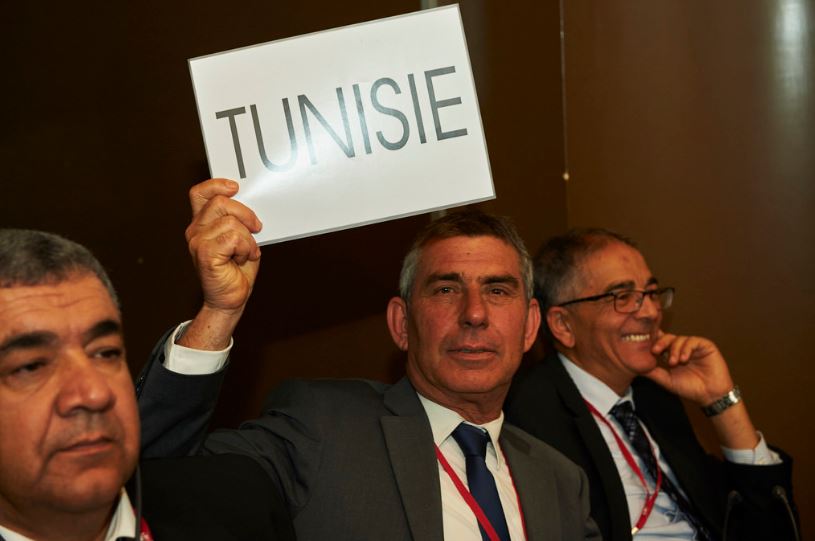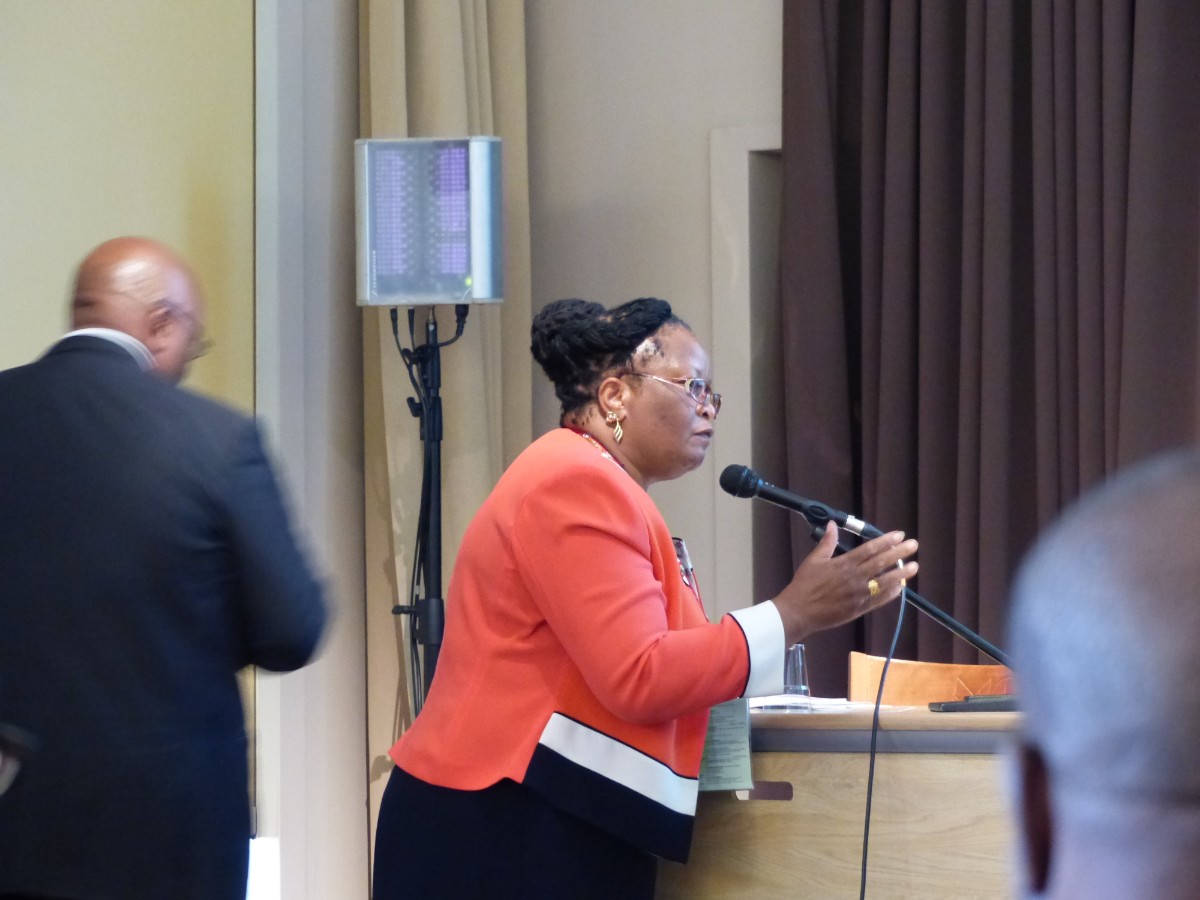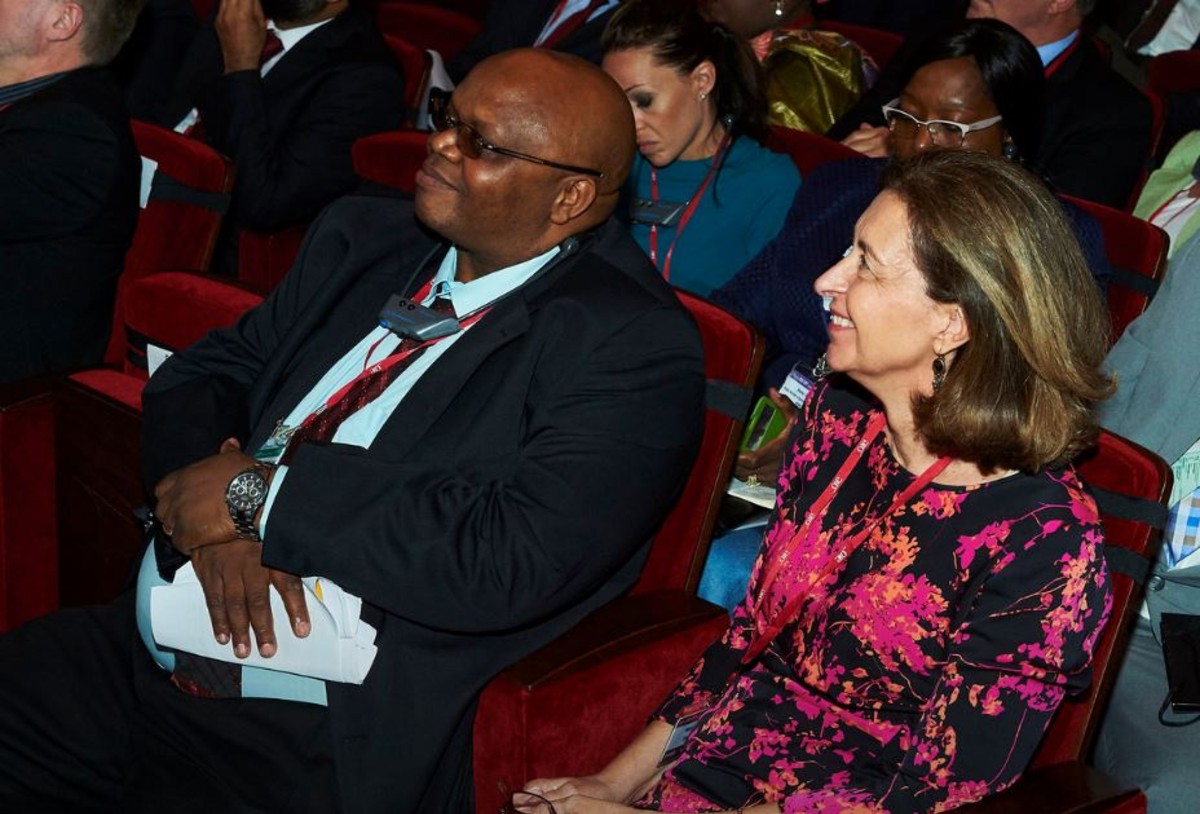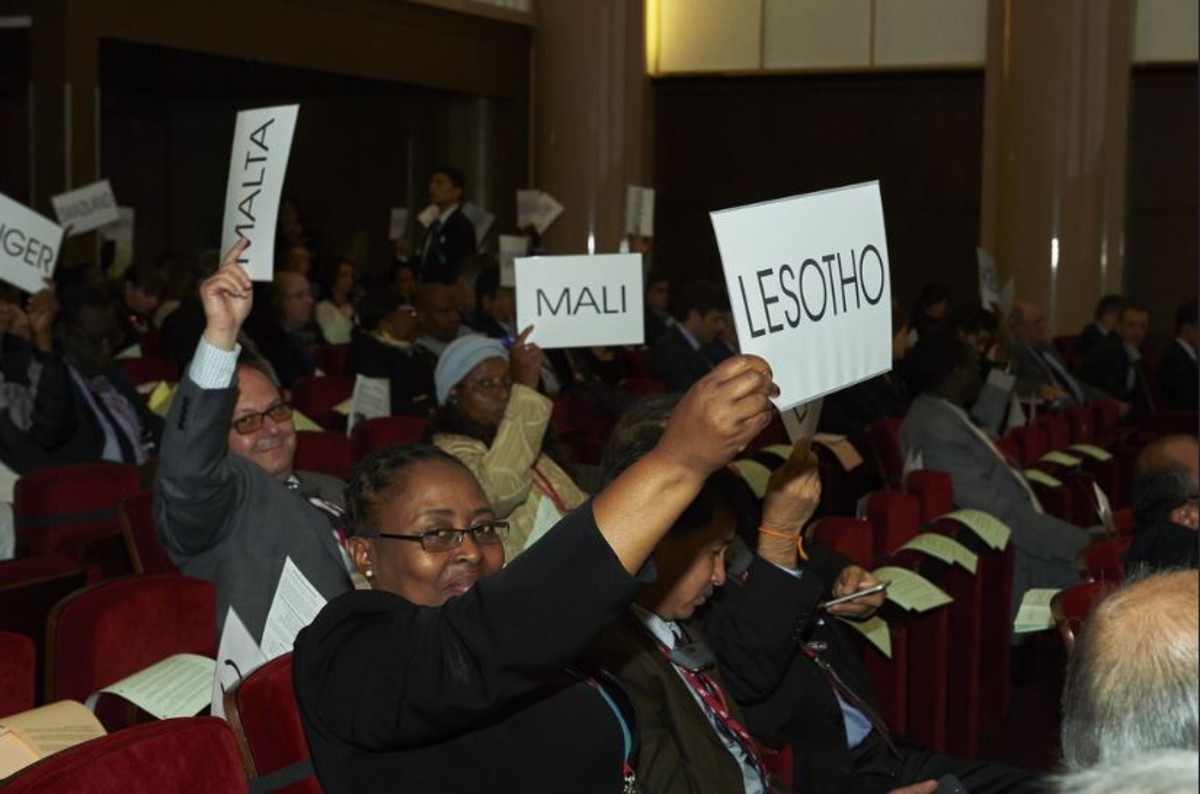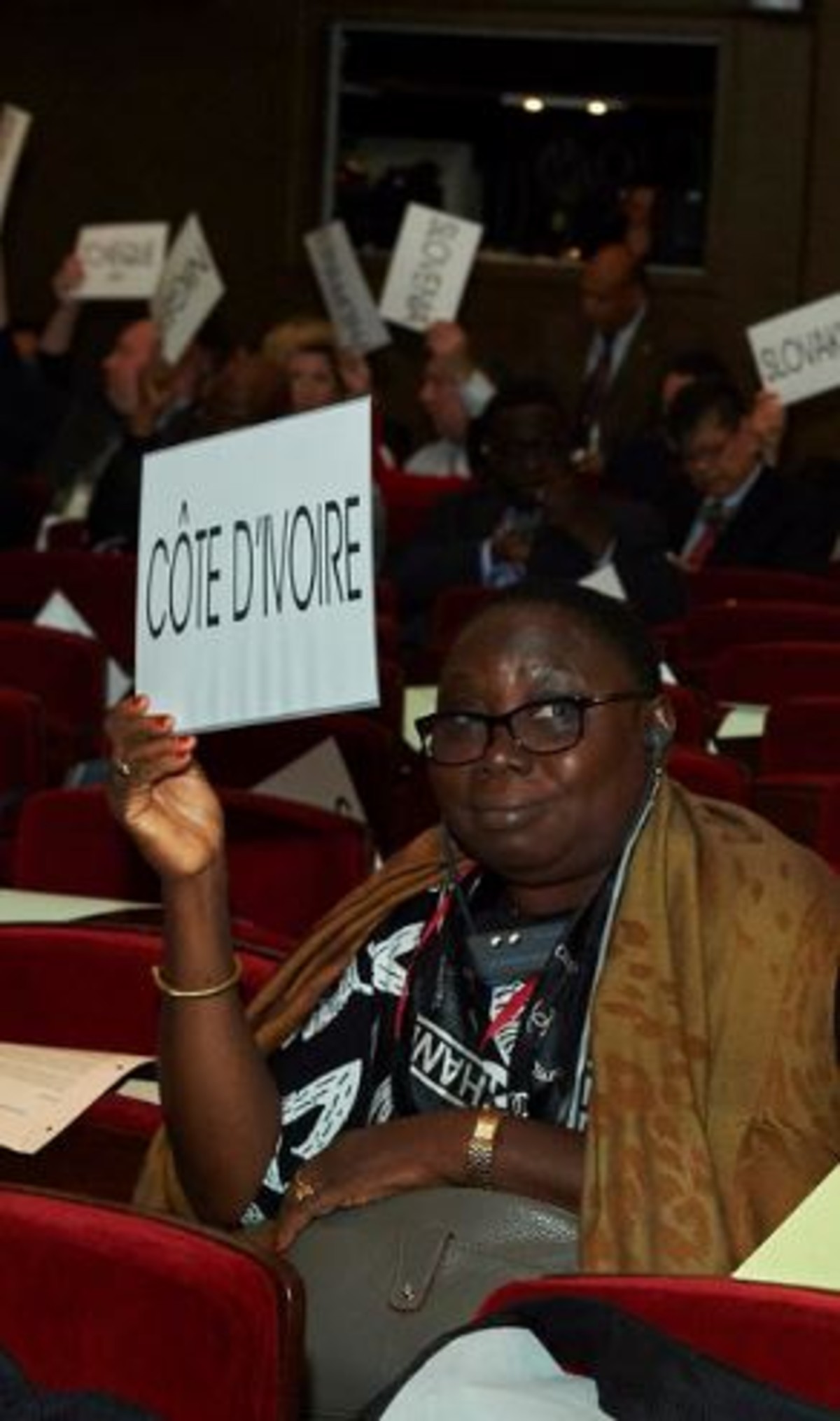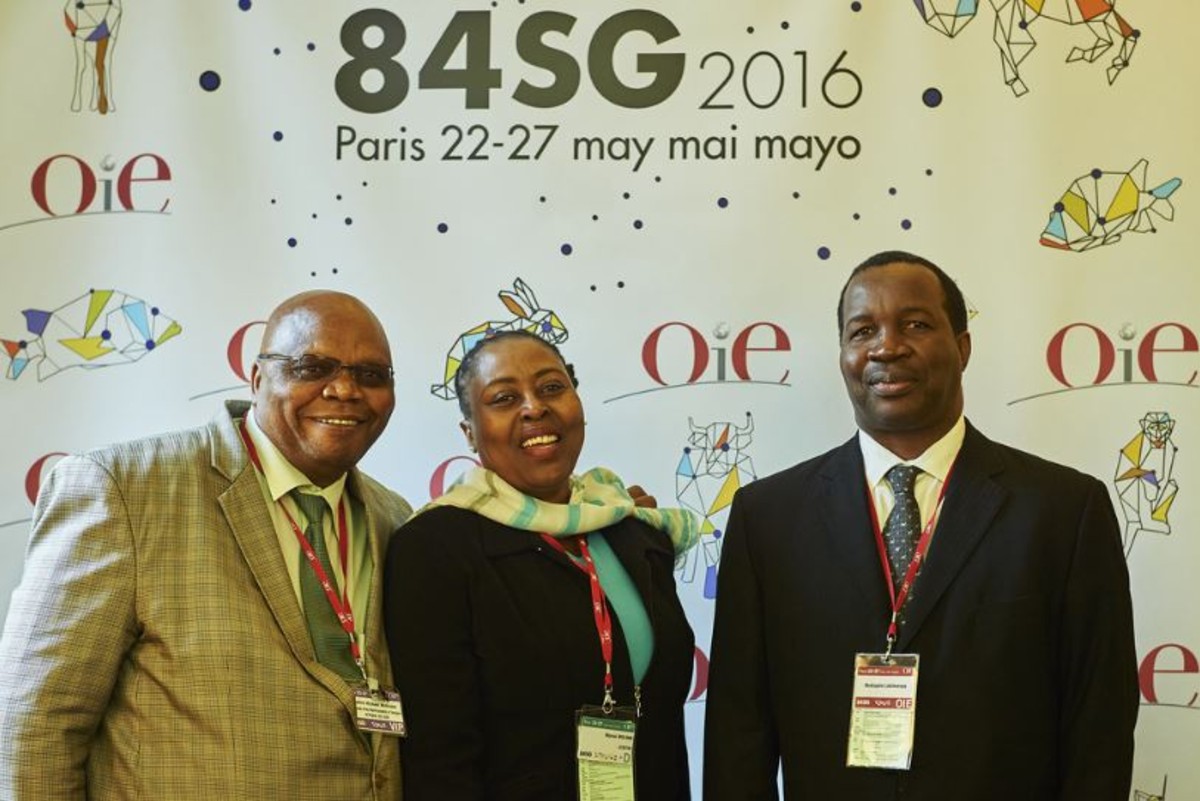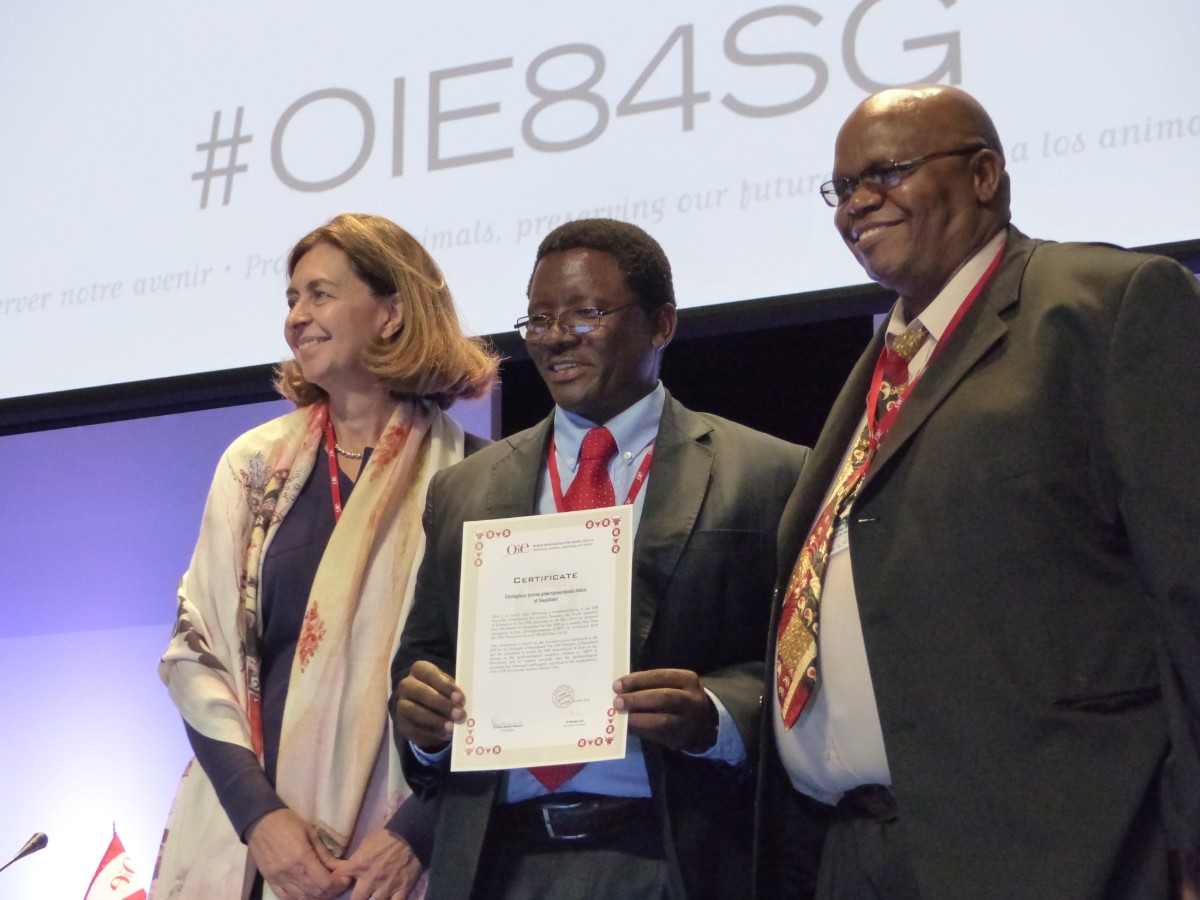
About About 850 participants, representing national Delegates from 144 Member Countries of the OIE (of which 34 were from Africa) and from 41 international, intergovernmental, regional and national organisations participated in the event. The opening ceremony was held at the Maison de la Chimie in the presence of the President of the OIE, Dr Botlhe Michael Modisane, the Director General of the OIE, Dr Monique Eloit and several ministers and members of government of OIE Member Countries.
84 GS Picture (c) P. Bastiaensen (oie) 2016
The OIE Delegate from Zimbabwe, Dr. Unesu Ushewokunze – Obatolu, intervening during the
meeting of the OIE Regional Commission for Africa. Picture © P. Bastiaensen (oie) 2016.
Distinguished guests addressed the opening speeches at the opening ceremony and – among them – there were ministers and representatives from Africa such as H.E. Anna Shiweda (Vice-Minister of Agriculture, Water and Forestry from Namibia), H.E. Patrick Ralotsia (Minister of Agriculture in the Republic of Botswana), H.E. Anna Bissiw (Minister of Agriculture in charge of Livestock of Ghana), H.E. Mohammed Tall (Minister of Livestock and Animal Productions of Guinea), H.E. Aminata Mbengue Ndiaye (Minister of Livestock and Animal Productions of Senegal), H.E. Musa Tibin Musa (Minister of Livestock, Fisheries, and Rangelands of Sudan) and Mr Andrew K. Tuimur (Principal Secretary for Ministry of Agriculture, Livestock and Fisheries of Kenya).
Only two Ministers from Africa delivered opening speeches : Botswana and Namibia.
The President of the OIE, Dr Botlhe Michael Modisane presented OIE Honorary Awards to members of the veterinary community for outstanding services to veterinary science and to the OIE.
The rapporteur for this technical item, Dr Jonathan Rushton (Royal Veterinary College, London) made the presentation. The African Union (AU) Member States, Members of the OIE, congratulated the rapporteur and co-workers for the excellent research undertaken to provide an informed presentation to this General Session. They acknowledged with appreciation the several problems encountered in most African countries that were highlighted by the rapporteur – especially as they related to the lack of expertise within the Veterinary Services to measure the economic impacts of disease outbreaks as well as the costs and benefits of disease control programs. The African Member States proposed the need for dedicated training and in this regard emphasised for a resolution addressing this area to be included in the forthcoming OIE International Conference on Education to be held in Bangkok, Thailand in June 2016.
84 GS Monique Eloit
The newly elected OIE Delegate from South Africa and President of the OIE World Assembly,
Dr. Botlhe Michael Modisane (left), and the newly elected OIE Director General,
Dr. Monique Eloit (right) listening to the opening addresses.
This session was chaired by Dr Nicholas Kauta from Uganda. The topic, presented by Dr. Jean-Pierre Orand (French National Veterinary Medicines Agency, ANSES, Fougères) generated discussions with many interventions from the audience, including from Kenya speaking on behalf of the 53 African Member States of the OIE.
They appreciated that antimicrobial resistance is high on the global agenda, because of the acknowledged significance of antimicrobial resistant organisms which pose a health risk to both animals and humans. They recognized the need for the prudent use of antimicrobial agents, as part of animal health governance. They congratulated the OIE for the efforts used in guiding Member States in the development of various AMR strategies, and in the prudent and responsible use of antimicrobial agents. They further congratulated the OIE for collaborating with other international organizations while fulfilling its mandate.
A total of 98 persons participated in the meeting of the Regional Commission for Africa on 23 May (Monday) representing member countries (34 out of the 54), regional and international organisations (AU-IBAR, AU-PANVAC, AU-PATTEC, FAO, WAEMU (UEMOA), ECCAS and CEBEVIRHA). The report of the President of the OIE Regional Commission for Africa was presented by Dr. Komla Daniel Batawui, Delegate of Togo and President of the Regional Commission. The report on OIE Council meetings was presented by Dr. Botlhe Michael Modisane, Delegate of South Africa and President of the World Assembly. Dr. Karim Tounkara, the OIE Regional Representative for Africa chaired the meeting.
The meeting was also the opportunity to share information on the activities and work programme of the OIE Regional Representation for Africa and the OIE Sub-Regional Representations for Southern, Northern and Eastern Africa. Additional topics were discussed, such as the update on the Organisation of the 22nd OIE Conference of the OIE Regional Commission for Africa to be held in Swakopmund, Namibia in February 2017; status of disease notifications by Members in Africa; state of play on the implementation of recommendations of the 21st Conference of the OIE Regional Commission held in Rabat, Morocco in February 2015; animal health programmes and activities related to the strengthening of Veterinary Services in Africa; OFFLU – the importance of contributing avian influenza genetic sequence data; update on antimicrobial resistance, proposal for designation of a new OIE Collaborating Centre in Senegal; and presentations from regional and international organisations.
Dr Daniel Bourzat, outgoing Advisor to the Regional Representative in Africa, took the floor to announce his retirement. He thanked all Delegates and colleagues from Africa for their excellent collaboration during his career in Africa. Dr Karim Tounkara on behalf of all participants thanked Dr Bourzat for his excellent work in Africa.
84 GS Picture (c) P. Bastiaensen (oie) 2016
Dr Daniel Bourzat, outgoing Advisor to the Regional Representative in Africa.
Through sustained commitments, several countries improved or gained official disease status recognitions or endorsement of official control programmes. The OIE World Assembly issued certificates to the African countries of Namibia and Swaziland :
The African OIE Member States appreciated the workload handled by the Scientific Commission in assessing applications for disease status recognition and endorsement of disease control programs. The progress made especially in the previous recognition of disease free areas for PPR in southern Africa and the current recognition of Namibia as the first country in Africa with a negligible risk status for BSE and Swaziland for a country free from CBPP was highly appreciated.
84 GS
Voting proceedings during the session dedicated to the OIE Terrestrial Code. Seen in front is the OIE Delegate from Lesotho, Dr. Marosi Molomo, casting her vote.
New international standards and guidelines were presented – by the relevant Specialist Commissions – during the General Session.
Both the OIE Terrestrial and Aquatic Codes will henceforth include definitions of OIE Standard and OIE Guideline in their glossaries.
In respect of the inclusion of future standards on the processing of reptiles for the production of skins, the OIE definition of terrestrial animal was enlarged to include reptiles, over and above the mammals, birds and bees.
Of particular interest from the OIE Terrestrial Code perspective, and from the African perspective, is the new chapter on the welfare of working equids (horses, donkeys, mules etc…), since these equids play an important role in Africa, and often face welfare issues. The African country representatives indicated that this chapter will greatly help the Member States to address the issues. They however, brought to the attention of the Assembly the fact that many other classes of working animals such as camelids, cattle, buffaloes, dogs are potentially affected by welfare issues and recommended either developing specific chapters for these species, or enlarging the scope of this chapter to include other working animals.
Also noteworthy is the merging of the three chapters on brucellosis as a single chapter on “Infection with Brucella abortus, Brucella melitensis and Brucella suis” and the renaming of the FMD chapter to “Infection with foot and mouth disease virus”, in line with the ongoing process of naming chapter according to pathogens, rather than diseases. In the same vein, the chapter on porcine cysticercosis has been renamed “Infection with Taenia solium (Porcine cysticercosis)”. There were further minor revisions of the chapters on slaughter and killing for disease control purposes, as well as chapters on broiler poultry and dairy cattle production systems.
No less than 22 chapters of the OIE Terrestrial Manual were also proposed for amendments. Of immediate interest to Africa were chapters on vaccines, brucellosis, Rift valley fever, rinderpest, fowl pox, infectious bursal disease and lumpy skin disease.
On the aquatic side, major revisions included the chapter on “Infection with yellow head virus genotype 1” and the chapter on general recommendations on disinfection, along with the renaming of certain diseases to reflect their causing pathogen, e.g. “Infection with Aphanomyces astaci (crayfish plague)” or “Infection with infectious hypodermal and haematopoietic necrosis virus”.
84 GS Cote d'Ivoire
Voting proceedings during the session dedicated to the OIE Terrestrial Code. Seen here is the OIE Delegate from Cote d’Ivoire, Dr. Diarra Cisse – Aman, casting her vote.
With regard to the follow-up to the recommendations of the 3rd OIE Global Conference on Aquatic Animal Health : Riding the Wave to the Future, held in Ho Chi Minh City (Vietnam) from 20 to 22 January 2015, Africa welcomed the OIE initiative to develop and roll out an aquatic PVS tool.
The African Member States indicated that this tool could be instrumental in strengthening the governance of aquatic animal health services in Africa as it has been the case for the classical PVS. The African OIE Member States reaffirmed their commitment to apply this aquatic PVS tool and requested the OIE to mobilize resources and expertise to respond to the demands of African Countries.
They strongly encouraged African and partner countries to strengthen twinning of reference laboratories and collaborating centres, and international organizations to strengthen the technical assistance provided to countries in this critical area. They further urged the OIE, in partnership with AU-IBAR and the Regional Economic Communities (RECs), to train African experts on the application of the aquatic PVS tool.
84 GS
From left to right : the OIE Delegate from South Africa and President of the OIE, Dr. Botlhe Michael Modisane, the OIE Delegate from Lesotho and Member of the OIE Working Group on Animal Welfare, Dr. Marosi Molomo and the OIE Sub-Regional Representative for Southern Africa, Dr. Moetapele Lethswenyo.
The Director General of the OIE presented the composition of the three OIE Working Groups (Wildlife, Animal Production Food Safety, and Animal Welfare), as validated by the OIE Council for the period May 2016 – May 2017.
The following are the names of the African experts who are part of these Working Groups :
The World Assembly approved the terms of a cooperation agreement with the Indian Ocean Commission (IOC), which will come into force after the signature of the agreement later this year. The Indian Ocean Commission is an African Regional Economic Community (REC) working on the regional integration of the island States and Territories of the Comoros, Madagascar, Mauritius, Mayotte, Réunion and the Seychelles. Its headquarters is based in Mauritius.
The OIE Delegate of Swaziland, Dr Roland Dlamini (middle) receives the certificate of recognition of country free from contagious bovine pleuropneumonia (CBPP). Picture © P. Bastiaensen (oie) 2016.
All pictures © Isabelle Zezima (oie) 2016, except where mentioned otherwise.
